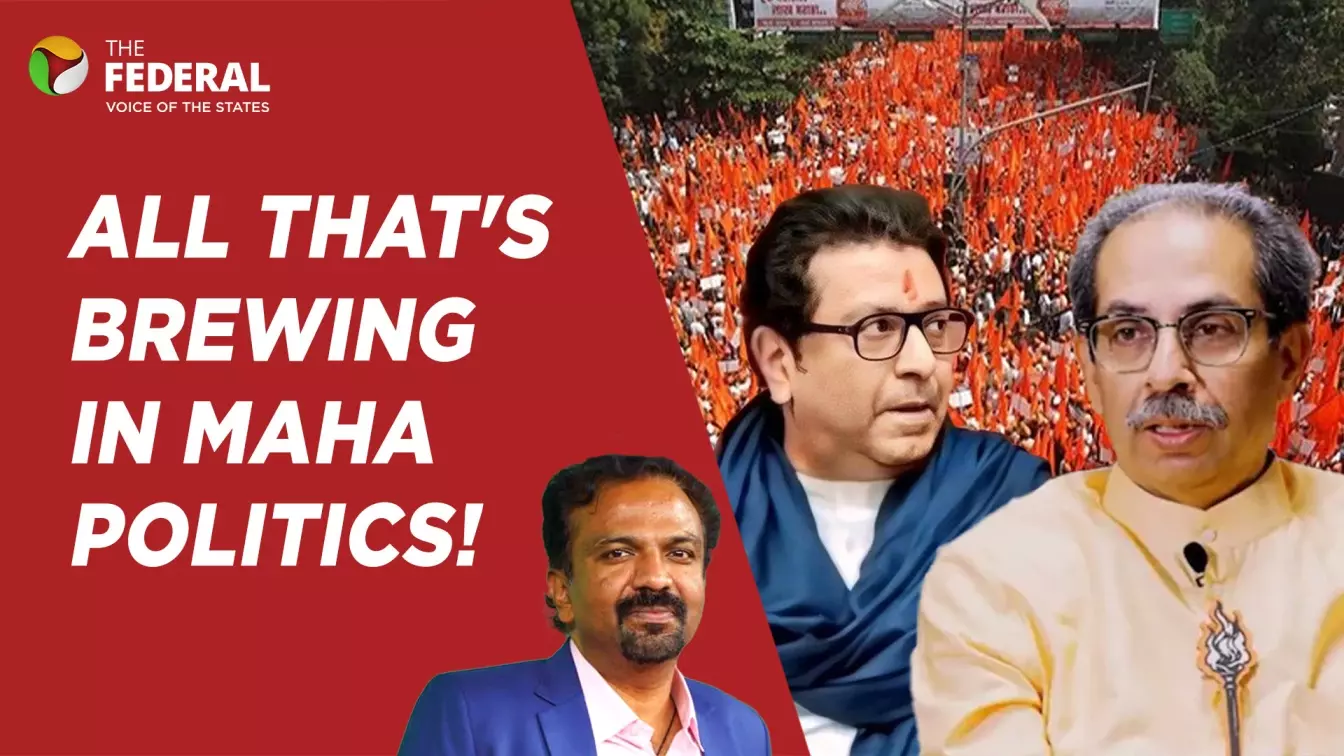Tensions over the three-language policy have reignited a deep-rooted identity debate in Maharashtra. With Shiv Sena (UBT) and Maharashtra Navnirman Sena joining hands to defend Marathi, senior journalist Jawahar Nadar breaks down the political signals behind this alliance, the Hindi vs Marathi fault line, and its likely impact on the BJP and upcoming civic elections.
Why has the three-language policy become a flashpoint again?The three-language formula has historically been met with resistance, especially in states like Tamil Nadu and Maharashtra. What’s happening now is not about opposing Hindi speakers per se, but about resisting the imposition of Hindi as a mandatory language.
The concern is that children from Classes 1 to 5 will be unnecessarily burdened by the policy. Marathi groups believe it's a backdoor way of imposing Hindi. This has pushed parties like the Shiv Sena (UBT) and MNS to rally together and organize what was initially a protest—but later turned into a victory rally after the government withdrew the proposal.
Also read: ‘We’ve come together to stay together’: Uddhav on reunion with Raj Thackeray
Is this really about education—or is it something deeper?
It's both cultural and political. Historically, there’s been tension between locals and migrants. In the 1970s and '80s, Shiv Sena targeted South Indians, accusing them of taking jobs meant for Maharashtrians. Later, when Raj Thackeray broke away from Shiv Sena, he targeted North Indians.
Now the same language divide is manifesting again.
It's not an anti-Hindi sentiment, but about Marathi identity being sidelined. A recent incident where a Hindi-speaking shopkeeper was attacked by MNS workers and controversial remarks by BJP MP Nishikant Dubey, suggesting that Maharashtrians live off the rest of India, have added fuel to the fire. Even BJP leaders like Ashish Shelar had to publicly counter Dubey's remarks to manage local sentiment.
Also read: ‘Maha’ reunion in Mumbai: Top 10 things Uddhav, Raj Thackeray said in their rally
So, is this all about the upcoming elections?
Absolutely. Civic elections, including BMC and Zilla Parishads, delayed since 2022, are expected in the next few months. Leaders are positioning themselves for electoral gains. Dubey’s comments are likely aimed at polarising voters in Bihar, but they've backfired in Maharashtra.
This shows it’s not just a language issue—it’s also about posturing ahead of the elections.
How do you see this affecting Uddhav and Raj Thackeray politically?The Marathi vote had been split between Uddhav Thackeray’s Shiv Sena and Raj Thackeray’s MNS. Now that the cousins are aligning—even if not formally—this unity is significant.
If they manage to forge a political alliance beyond language, they become a serious force. It could dent Eknath Shinde’s Shiv Sena faction, which holds a strong base in the current government. The revival of Balasaheb Thackeray’s legacy through this unity could trigger a massive shift.
Also read: Stalin slams BJP for ‘Hindi imposition’, lauds Maharashtra’s resistance
What impact could this have on BJP and Eknath Shinde?
Eknath Shinde stands to lose the most. His claim to be the rightful heir of Shiv Sena, politically and ideologically, faces a challenge now. He has enjoyed temporary acceptance, but that could fade quickly.
If Uddhav and Raj unite formally, they could sweep key cities like Mumbai, Thane, Kalyan, and Nashik in the civic polls. For BJP, Shinde may no longer be essential to keep the government afloat, given their own strength in the Assembly.
Will this unity lead to a new political equation in Maharashtra?
That depends. Right now, the brothers say their alliance is for Marathi pride. Whether that translates into an electoral alliance remains to be seen. If it does, the impact could be dramatic, especially in Mumbai—India’s richest civic body.
Shinde’s faction could be the first casualty. His projection as the leader of the Marathi cause will no longer hold if both the Thackerays combine their strengths.
Also read: Why did Congress skip Thackeray cousins’ reunion?
What about the INDIA bloc and its role in this language politics?
Congress is playing it safe. While leaders like Jitendra Awhad and Supriya Sule joined the rally, Congress stayed away—perhaps to avoid hurting its prospects in Hindi-speaking states like Bihar and UP.
Congress knows that aligning directly with MNS could alienate core voters elsewhere. It’s likely that the major parties—Congress, Shiv Sena (UBT), and NCP—will contest local elections separately to maximize candidate opportunities.
So, no united INDIA front in civic polls?
Correct. The opposition unity we saw during national elections won’t necessarily apply at the local level. Each party wants to field more candidates in the BMC and Zilla Parishad elections.
That means Uddhav and Raj may go ahead with their own plans, independent of Congress. If they succeed, it could be a turning point for both parties and for Maharashtra politics.
Also read: Reunion of Thackerays has rattled Fadnavis, other Mahayuti leaders: Raut
(The content above has been generated using a fine-tuned AI model. To ensure accuracy, quality, and editorial integrity, we employ a Human-In-The-Loop (HITL) process. While AI assists in creating the initial draft, our experienced editorial team carefully reviews, edits, and refines the content before publication. At The Federal, we combine the efficiency of AI with the expertise of human editors to deliver reliable and insightful journalism.)



